Brother Of Executed Iranian Wrestler Freed From Solitary Confinement
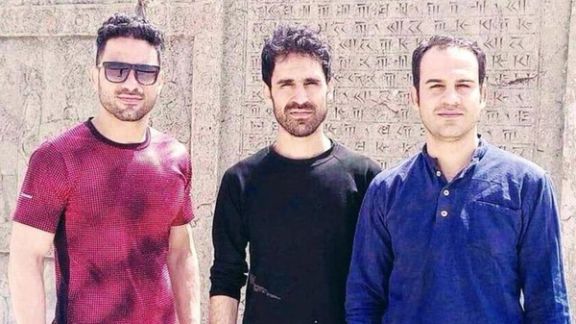
One of the brothers of the executed Iranian wrestler Navid Afkari has been released from prison but another brother, Vahid, is still in solitary confinement.

One of the brothers of the executed Iranian wrestler Navid Afkari has been released from prison but another brother, Vahid, is still in solitary confinement.
The family said in a tweet on Saturday that Habib Afkari was freed after months of solitary confinement.
Habib had been sentenced to 27 years and 3 months in prison and 74 lashes and was being kept in windowless solitary confinement cells since Navid’s execution in September 2020.
Vahid was sentenced to 54 years and 6 months in prison and 74 lashes and is still in solitary confinement.
Amnesty International said in June 2021 that Vahid and Habib were being subjected to torture and other ill-treatment in Adelabad prison in Shiraz, and were denied access to adequate healthcare, fresh air, telephone calls and face to face family visits.
Navid Afkari was arrested along with his brothers Habib and Vahid during protests in Iran in 2018 and was executed despite international campaigns to save his life.
He initially received a death sentence for an “act of war against God” for his participation in protests, the authorities later charged him and his brothers with the murder of a government employee.
According to the Oslo-based Iran Human Rights in September 2021, Shahin Naseri, a prisoner who testified that Navid Afkari was tortured to confess to killing a water company security guard in 2018, died in custody in Greater Tehran penitentiary “in suspicious circumstances”.
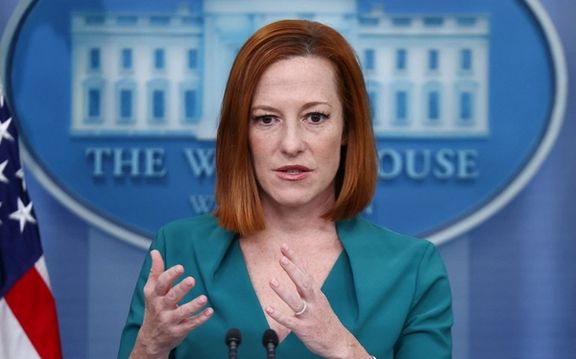
The White House Press Secretary Jen Psaki on Friday did not rule out importing Iranian oil once a nuclear deal is reached in Vienna, or lifting IRGC sanctions.
In her daily briefing to reporters, she was asked if an Iranian nuclear agreement in Vienna would “factor into the supply consideration at this point.”
Psaki replied that restoring the Obama era nuclear deal known as the JCPOA is the priority of the administration, but added, “Obviously, as a part of that, if you go back to the implementation of the JCPOA, would be the availability of oil. But — but I would say that our first-and-foremost priority focus is on preventing Iran from acquiring a nuclear weapon.”
Another reporter pressed the issue later in the briefing and Psaki responded, “Again, there’s not a — an Iran — there’s not a deal at this point in time. While we’re close, we’re not there. So, if and when we get to that point, we can speak to that question.”
The issue of the Biden administration’s position toward a possible purchase of Iranian oil came up on March 3, when Transportation Secretary Pete Buttigieg in response to MSNBC did not rule out the possibility, while many in the United States call for a boycott of Russian imports.
Critics reacted to Buttigieg’s remark that President Joe Biden wants “all options are on the table,” by saying that domestic sources must be the energy priority of the administration. “Using North American oil to decouple economic dependency on the resources of hostile nations is a long-term solution,” Representative Ralph Norman (R-SC) tweeted on Thursday.
Psaki also did not deny that the US is considering removing Iran’s Revolutionary Guard, IRGC, from the list of foreign terrorist organizations.
“Look, there — we are close. We are making progress. But we are — there’s still more work to be done, and I’m just not going to negotiate from here,” she said, avoiding a clear and direct answer to a question.
The Biden team had insisted all along that it is willing only to remove nuclear sanction imposed by former president Donald Trump, while Iran was demanding the lifting of all sanctions, including terrorism ones against the IRGC, some top officials and entities involved in supporting militant groups.
However, Gabriel Noronha, former Special Advisor for the Secretary's Iran Action Group in the Trump administration in a series of tweets on Wednesday quoted State Department, National Security Council and European Union unnamed officials as having authorized him to reveal that US Special Envoy for Iran Rob Malley was planning to lift IRGC sanctions.
The question directed to Psaki on Friday was a clear chance for her to comment on the issue, but she avoided giving an answer.
Critics of the administration’s policies toward Iran have expressed deep misgivings about lifting sanctions of individuals and entities who are accused or suspected of ties to terrorism, such as the bombing of a Jewish community center in Buenos Aires, Argentina in 1994 that killed dozens of people.
They also say that Iran organized and supported numerous attacks against US forces in Iraq in the past 19 years, including many drone and rocket strikes in 2021, by its proxy militias.
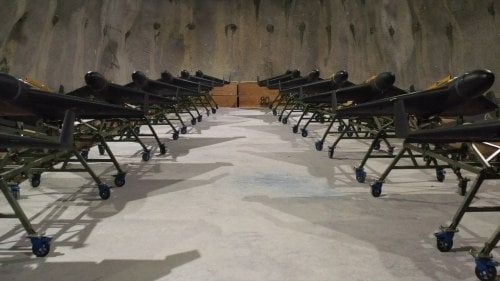
Iran’s Revolutionary Guard has unveiled two underground bases for attack drones and missiles, as nuclear talks with world power have reached a critical stage.
The “two cities of missiles and drones” were inaugurated on Saturday concurrent with the visit of International Atomic Energy Agency Director General Rafael Mariano Grossi to Tehran and the final days of the Vienna talks to revive the 2015 nuclear deal known as JCPOA.
According to Sepah News, IRGC’s information website, the bases are constructed in the form of tunnels (video) in the heart of high mountains and house ground-to-ground missile systems and attack drones, including drones with a range of 2,000 kilometers, two-missile launch platforms and multi-drone launch platforms. The locations of the bases are not disclosed.
The commander IRGC’s Aerospace Force, Brigadier General Amir-Ali Hajizadeh, emphasized the long range of the drones and the capacity of these bases during a ceremony, saying that “We can simultaneously launch 60 UAVs from the drone base” and “we can hit any hostile target.”
Hajizadeh added, “The power of our missile fire and simultaneous launches have increased more than six to seven times, and the preparation time… has been greatly reduced.”
Pentagon says it is working hard to contribute to the self-defense needs of allies and partners in the region to counter threats posed by Iran’s missile program while Iran says it will become one of the world's biggest arms exporters once US sanctions are lifted.
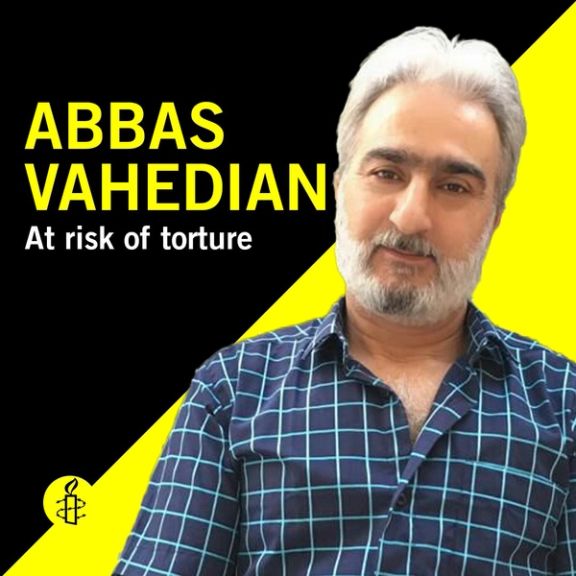
International human rights organization Amnesty International says imprisoned Iranian activist Abbas Vahedian Shahroudi health has seriously deteriorated in solitary confinement.
In a statement on Friday, the UK-based rights group said that Iran’s Intelligence Ministry and prosecutors in Mashhad – in the northeastern province of Khorasan-e Razavi – are endangering the life and safety of the “tortured activist”. Vahedian was one of the signatories of a letter calling for the resignation of Supreme Leader Ali Khamenei.
Amnesty said the authorities are “deliberately denying him adequate medical care and keeping him in prolonged solitary confinement”.
“The authorities are concealing the circumstances leading to two episodes of emergency hospitalization between 24 and 28 February 2022 and denying him visits with his family and lawyer”, the statement added.
Vahedian and his daughter were assaulted and beaten when security forces barged into his home to arrest him.
In 2019, Vahedian and 13 other political activists wrote a letter to Khamenei, calling for his resignation and changing the constitution, saying “the current regime is irredeemable and insists on its mistakes and adds to its tyranny”.
Iranian security has been denying medical care to prominent political prisoners in recent months. They have reportedly denied activist Sepideh Gholian (Qolian) sick leave for her severe Covid-19 symptoms. One month earlier, Baktash Abtin, another activist, died of Covid complications after being denied timely treatment in Tehran’s Evin prison.
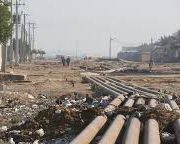
It could take months before any large quantities of Iranian oil hit the markets if a nuclear deal is reached and sanctions lifted, a Reuters analysis said on Friday.
With oil prices hitting almost $120 this week, market watchers await the outcome of indirect talks between the United States and Iran in Vienna to see if sanctions imposed on Tehran’s oil exports will be lifted and global supplies boosted amid the Ukraine crisis.
However, any agreement will not immediately allow Iran to legally export oil as compliance with the agreement would take a few months to verify, Reuters said, adding that the same happened in when the first nuclear deal was inked in 2015 when it took a few months until Iran began exporting crude.
Most refiners around the world have also shunned Iranian oil for several years and they would need two to three months to finalize technical arrangements to enable imports from Iran to resume, analysts said.
Iran has tens of millions of barrels of oil in storage that can be released once its compliance with the nuclear agreement is verified, but some of that oil is heavy condensate and not very helpful to lower prices.
The analysis said that it would take Iran up to six months to raise output by around one million barrels per day.
OPEC led by Saudi Arabia has refused to break an agreementreached before the Russian invasion and boost output.
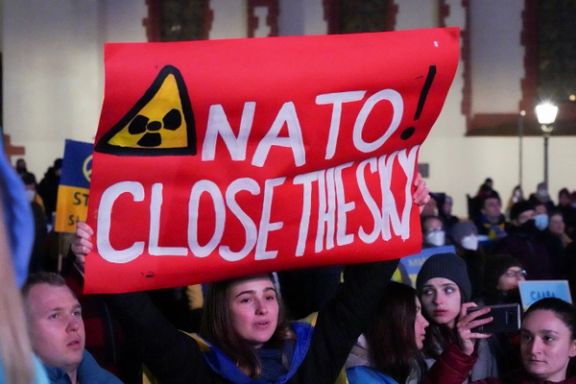
Iran's Friday imams across the country condemned the United States over the Ukraine war, following the government's position of support for the Russian ally.
"The American adventurisms are behind the recent incidents in Ukraine,” Mohammad-Javad Haj-Aliakbari told Tehran's Friday prayer congregation. “The one responsible is America, which has sacrificed Ukraine to its own greed.”
In Qom, the imam Mohammad Saeedi said “America and the western barbarians wage regional and international wars to sell their weapons." He suggested that "the management of the world" would be better in the hands of "pious people."
In Sari, provincial capital of Mazandaran, Mohammad-Bagher Mohammadi said Moscow was entitled to ensure its own security given Nato’s expansion in eastern Europe. Russia “attacked Ukraine to make Nato give up its meaningless thoughts,” he told his congregation.
Ali Khamenei, Iran’s Supreme Leader Tuesday called for a peaceful settlement while suggesting Ukraine had fallen victim to US policies. “Support by Western governments for administrations and politicians that have been installed by them is a mirage,” Khamenei said, referring to the messy withdrawal of forces from Afghanistan after Washington’s agreement with the Taliban.
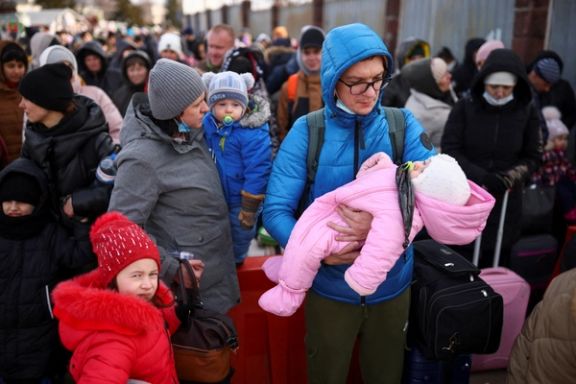
Khamenei also claimed that Ukrainians were not resisting strongly "because they did not agree with [their] government." Kayhan newspaper made a similar allegation this week referring to “scarecrow” defense, while the world has watched the fighting and many have admired the Ukrainian resistance to the invasion.
Puppets
Hasan Alidadi, Friday imam in Kerman province, made similar remarks in his sermon Friday: "Regarding the recent Russian attack on Ukraine…when governments are puppets and people's role is not marked, city after city surrenders as fast as you see." Yousef Tabatabeinejad, the Friday imam in Esfahan, also argued Ukrainians were leaving because "they are not in agreement with the government".
General guidelines for over 600 Friday sermons are set out by the Friday Prayer Policymaking Council, whose head and members are appointed by Khamenei.
Alongside India, Iraq, Pakistan and South Africa, Iran was among 35 countries that abstained from a vote Wednesday at UN General Assembly condemning Russia over its invasion of Ukraine. Four countries − Belarus, North Korea, Eritrea and Syria − joined Russia in voting against the motion. Israel ended up voting in favor after earlier expressing neutrality.
Support voiced for Ukraine
While the government, its media and imams have supported Russia, thousands of Iranians on social media have condemned the invasion and vented anger at leaders for siding with Moscow.
Even in government-controlled media, some pundits and editors have cautiously criticized Russia and demanded a more neutral position by Iran.
Mohammad-Reza Khabbaz, a reformist former member of parliament, told Arman-e Melli newspaper in an article published Thursday that he had expected Iran “to oppose such aggression and condemn it in the early days.” Khabbaz said Iran should “condemn those [in the west] who were responsible for creating these circumstances but shouldn't allow Russia to take benefit from our silence.”